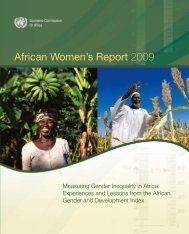Community-driven development decision tools for rural - IFAD
Community-driven development decision tools for rural - IFAD
Community-driven development decision tools for rural - IFAD
- No tags were found...
Create successful ePaper yourself
Turn your PDF publications into a flip-book with our unique Google optimized e-Paper software.
The answer to the second question is more complex. <strong>Community</strong> elections <strong>for</strong> VDCs andManagement Committees (MCs) of CIGs typically are influenced by line agencies and localpolitical intermediaries. It is almost inevitable that this will occur at the beginning of a CDDprocess. But this initial arrangement must be made to evolve over time. The policy issue is toidentify a mechanism that can be put in place to monitor the evolution towards communityautonomy and democratic governance.Building capacity<strong>IFAD</strong>’s emphasis on CBOs has important implications <strong>for</strong> the design of projects’ capacitybuildingcomponents. If CBOs are only facilitators of the benefits received by their members,the range of capabilities they require is less than if the objective is to develop CBOs aspromoters and managers of socio-economic change.All CDD projects have sizeable capacity-building components. Capacity-building may be• limited to the community service providers (i.e. essentially government units);• extended to CBOs to enable them to operate and manage infrastructure facilitiesconstructed <strong>for</strong> them;• focused on making the CBOs capable of fully participating in the design, contracting,supervision and management of social and productive infrastructure and other<strong>development</strong> activities (including <strong>rural</strong> financial services) that they may want toundertake <strong>for</strong> themselves.The last of these options represents the approach that has the greatest CDD content and is theclosest to <strong>IFAD</strong>’s corporate objectives and strategies.Costs of building capacityAdequately trained CBOs are essential <strong>for</strong> CDD. Since the cost of capacity-building at thecommunity level is far from negligible, governments tend to halt initiatives that supportdeveloping administrative and technical capabilities below the district level. This attitude issupported by evidence that decentralization at the district level costs much more thanoriginally <strong>for</strong>ecast by the designers of administrative re<strong>for</strong>ms.The cost of capacity-building <strong>for</strong> CBOs is affected by the functions that CBOs are expectedto per<strong>for</strong>m and the complexity of the procedures required to plan, finance, implement andoperate a microproject. There<strong>for</strong>e, simplifying procedures can improve the cost-effectivenessof the capacity-building components of CDD projects. There are many relevant issuesregarding procedures (e.g. the conditions needed to grant legal status to a CBO andmicroproject design, approval, procurement and disbursement practices) which can make aBox 8Cost advantages of implementingcommunity microprojects by CBOsEntrusting small public works (e.g. building aschool, water supply or microirrigation scheme)to grass-roots community organizations hasbeen done by the Social Investment Fundsprojects in many Latin America countries withpositive results.Whenever a democratically-elected communityorganization participates in the design of amicroproject, it freely chooses the techniciansand artisans, purchases the materials and isresponsible <strong>for</strong> construction. In the greatmajority of cases, the result is a cheaperproduct, promptly and largely cofinanced bythe users and designed with the contribution ofthe potential beneficiaries. It is also much moresustainable than when the product is designedand constructed by highly-qualified enterprisesexternal to the community.Source: R. Haudry de Soucy. Personal communication to the<strong>IFAD</strong> 2005 e-conference on CDD.18
















